Master Course Interviews in 2019
Histrical Logistics Multi-Scale Analysis with Counter-Fact Approach
Khan Shehroze Khalid
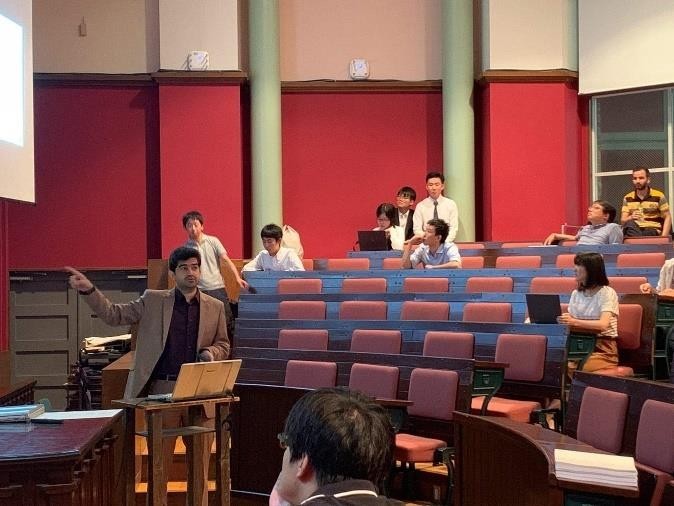 £Final Defense
£Final Defense
Eiji: Your master's presentation has been successfully completed.
Congraturations. The two-year research life is finally to end.
Please tell us why you chose our laboratory first.
Khan: After completion of my Bachelorfs degree in 2014, I entered into
my professional life where I worked three years in Highways Consultancy
Firm designing Highways to resolve geometric issues. During that period,
I realized that Pakistan had sufficient technical capabilities to
resolve such issue even for the future. Lacking factor was regarding the
Traffic Planning which is (like many other countries) a major problem in
Pakistan due to drastic increase in Traffic over the past few years.
These factors led me to look for a platform where I will be able to
learn some skills to help my country overcome these problems. This lab
(Transportation Research & Infrastructure Planning - TRIP) fulfills this
purpose because of its direct link with transportation planning based on
travel behavior. Both the research in this lab which had been done and
is ongoing, helps an organization better forecast the traffic behavior
in order to design the infrastructure which is most crucial aspect
especially for a country like Pakistan as it needs such planning to let
it go through the development stage smoothly. This is the main reason I
chose this laboratory for my master research.
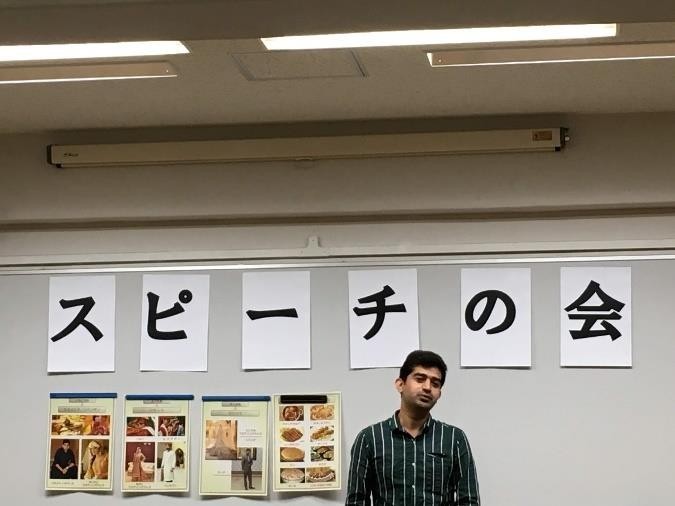 £Japanese Language Speech
Eiji: What did you really like to come to the University of Tokyo? I
participated in the Japanese speech contest held at Civil Engineering
last year, and I was impressed by the Japanese speeches of you.
Khan: For me, it was like dream come true situation when I finally got
admitted to The University of Tokyo because it got me one step closer to
be the part of world leading research. By studying in this university, I
have not only gained the technical knowledge, but by having interaction
with Japanese students and other international students via different
programs organized by university, I had wonderful experience of Japanese
society. One of the most enjoyable and unforgotten experience was the
Japanese Language Class - JLC held by Civil Engineering Department which
I took for one whole year where I learned not only the Japanese Language
but had first-hand experience of Japanese culture. Also, one of my most
enjoyable moments was the time when I participated in May Festival where
I had wonderful experience & interaction with Japanese people.
£Japanese Language Speech
Eiji: What did you really like to come to the University of Tokyo? I
participated in the Japanese speech contest held at Civil Engineering
last year, and I was impressed by the Japanese speeches of you.
Khan: For me, it was like dream come true situation when I finally got
admitted to The University of Tokyo because it got me one step closer to
be the part of world leading research. By studying in this university, I
have not only gained the technical knowledge, but by having interaction
with Japanese students and other international students via different
programs organized by university, I had wonderful experience of Japanese
society. One of the most enjoyable and unforgotten experience was the
Japanese Language Class - JLC held by Civil Engineering Department which
I took for one whole year where I learned not only the Japanese Language
but had first-hand experience of Japanese culture. Also, one of my most
enjoyable moments was the time when I participated in May Festival where
I had wonderful experience & interaction with Japanese people.
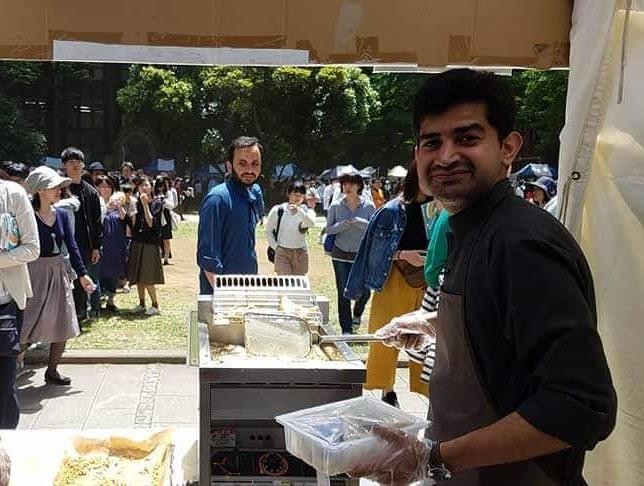 £May Festival 2018
Eiji: Ask about research. Khan worked on histrical logistics pattern
analysis based on equilibrium theory. Can you explain your research?
Khan: Many of the Developing countries are now passing through a phase
of rapid development investing hugely in infrastructure. Pakistan is one
of those countries where huge investment has been made on Transportation
Infrastructure under the domain of Logistics for handling container
traffic. But because of the non-availability of Past network data, there
is no justification for the future investment (going in the dark
situation). This led me to develop the past networks maps for which I
used the Two Layered Network Assignment Model considering three networks
i.e. Inter-modal Network, Maritime Network & Hinterland Network.
Historical data for all the networks was obtained from different sources
and then prepared for analysis for 4 different time periods i.e. 1983,
1993, 2003 & 2013. This research was a two level research where one
level dealt with the Global evolution of Maritime Networks from 1983 to
2013 while the other level dealt with Inter modal Analysis for case of
Pakistan where containerized traffic network maps were developed based
on Multi Modal Equilibrium Assignment. Finally, the results were
evaluated based on counter fact approach and policy was simulated in
order to solve the problem identified & to achieve Pakistan Vision 2025.
Eiji: The analysis of multi-scale logistics networks is very important
when considering the partial OD patterns that have changed dramatically
in recent years in South Asia. However, it was difficult to collect data,
and Lloyds insurance data and field surveys were difficult.What is the
most difficult point in the master's thesis?
Khan: Most difficult point in my master's thesis was the preparation of
historical data which was very challenging. I had to prepare 4 main data
sets for each year (16 main data sets in total for all considered years).
Non-availability of data led me to look at various sources from which I
had to do many transformations, which were not only time taking but also
very challenging. Not only that, but I had to do many field surveys
exploring various libraries and visiting various departments in Pakistan.
Eiji: On the other hand, when did you do your research and were most
happy or interesting?
Khan: Whenever I do a work, I do it perfectly giving it a serious
dedication & interest and that is what I did with my research. There
were some moments when things got stuck and made me a little tense but
overall, whole of the research idea and work done was very interesting.
Things got more interesting when I finally started to get my results of
analysis based on which I made historical containerized traffic network
maps of Pakistan. That was the moment of happiness, but of course, that
was not the end of research.
Eiji: How about thesis defense? You looks getting too nervous when your
turn comes.
Khan: Thesis defense itself is a very challenging moment where we need
to present the core research in given time in front of an audience full
of well experienced and knowledgeable professors. I worked very hard in
order to achieve my master's research goal. After thesis submission, I
practiced a lot for the presentation asking myself every possible
question regarding my research. Since, presentation time was very less
and the data to present was very much, things got a little nervous but I
tried my best not to lose my confidence. I presented my research,
answered the worthy questions asked to me by different professors up to
a satisfactory point, hence successfully finished my final defense.
Thesis submission & Final Defense
£May Festival 2018
Eiji: Ask about research. Khan worked on histrical logistics pattern
analysis based on equilibrium theory. Can you explain your research?
Khan: Many of the Developing countries are now passing through a phase
of rapid development investing hugely in infrastructure. Pakistan is one
of those countries where huge investment has been made on Transportation
Infrastructure under the domain of Logistics for handling container
traffic. But because of the non-availability of Past network data, there
is no justification for the future investment (going in the dark
situation). This led me to develop the past networks maps for which I
used the Two Layered Network Assignment Model considering three networks
i.e. Inter-modal Network, Maritime Network & Hinterland Network.
Historical data for all the networks was obtained from different sources
and then prepared for analysis for 4 different time periods i.e. 1983,
1993, 2003 & 2013. This research was a two level research where one
level dealt with the Global evolution of Maritime Networks from 1983 to
2013 while the other level dealt with Inter modal Analysis for case of
Pakistan where containerized traffic network maps were developed based
on Multi Modal Equilibrium Assignment. Finally, the results were
evaluated based on counter fact approach and policy was simulated in
order to solve the problem identified & to achieve Pakistan Vision 2025.
Eiji: The analysis of multi-scale logistics networks is very important
when considering the partial OD patterns that have changed dramatically
in recent years in South Asia. However, it was difficult to collect data,
and Lloyds insurance data and field surveys were difficult.What is the
most difficult point in the master's thesis?
Khan: Most difficult point in my master's thesis was the preparation of
historical data which was very challenging. I had to prepare 4 main data
sets for each year (16 main data sets in total for all considered years).
Non-availability of data led me to look at various sources from which I
had to do many transformations, which were not only time taking but also
very challenging. Not only that, but I had to do many field surveys
exploring various libraries and visiting various departments in Pakistan.
Eiji: On the other hand, when did you do your research and were most
happy or interesting?
Khan: Whenever I do a work, I do it perfectly giving it a serious
dedication & interest and that is what I did with my research. There
were some moments when things got stuck and made me a little tense but
overall, whole of the research idea and work done was very interesting.
Things got more interesting when I finally started to get my results of
analysis based on which I made historical containerized traffic network
maps of Pakistan. That was the moment of happiness, but of course, that
was not the end of research.
Eiji: How about thesis defense? You looks getting too nervous when your
turn comes.
Khan: Thesis defense itself is a very challenging moment where we need
to present the core research in given time in front of an audience full
of well experienced and knowledgeable professors. I worked very hard in
order to achieve my master's research goal. After thesis submission, I
practiced a lot for the presentation asking myself every possible
question regarding my research. Since, presentation time was very less
and the data to present was very much, things got a little nervous but I
tried my best not to lose my confidence. I presented my research,
answered the worthy questions asked to me by different professors up to
a satisfactory point, hence successfully finished my final defense.
Thesis submission & Final Defense
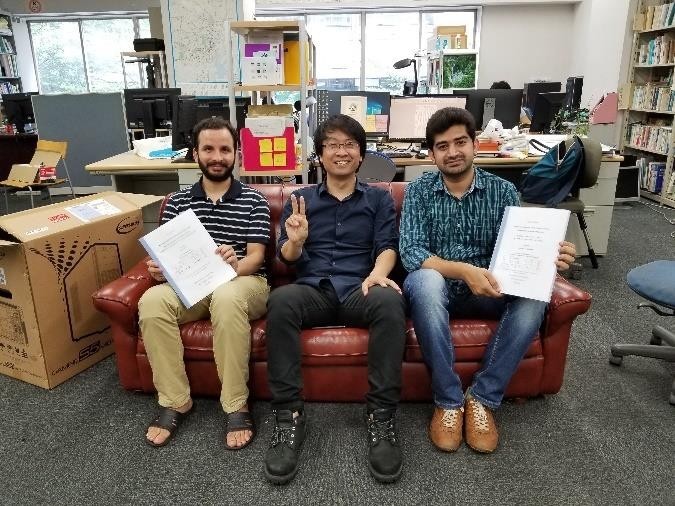 £Finishing Master thesis with Babar and Eiji
Eiji: The master's defense is shorter than the amount Khan did in your
master's thesis, lol. We all went to Kobe to study, but what is your
favorite place in Japan and where do you like to settle down? Halal
food stores and Muslim mosques are also increasing in Toshima.
Khan: In my stay of two years in Japan, I have been to many places
including Kobe, Kyoto, Osaka, Hiroshima, Ishinomaki, Nikko etc. Halal
food stores and mosques are increasing in Tokyo but if we go out of
Tokyo, it is relatively difficult to find halal food stores & mosques.
No doubt, whole of the Japan is very beautiful and peaceful but I
personally like historical & natural places in comparison with man-made
places and because of it, my favorite places in Japan include Kyoto on
top and then Hiroshima City. As far as settling down is concerned, I
think most important factor in this regard is the Job location but
regardless of it, Kyoto will be first on my list. If I have to settle
down in Tokyo, then I really like Mitaka because it is a little far from
the busy area, peaceful and convenient. Last but not the least, Dasio &
Don Quijote are two of my most favorite stores in Japan?.
Eiji: You strived harder for some goal, your family and country. My last
question is about Japanese student and UT and Japan.
Khan: If you are thousands of miles away from your home & your family,
it is very difficult to achieve a goal without the worthy support and
here came the part of Japanese students and this university. Throughout
my journey of masterfs in University of Tokyo, I found other Japanese
students (especially my Lab members and my friends) to be very kind and
helpful not only in matters related to study but also related to daily
Japanese life. Overall, I have learned so many things from Japanese
people among which kindness & politeness are two main factors. Japan is
very unique in terms of its culture & food which is essence of it and it
made me love Tempura?. Being a Muslim, prayer place and Halal food are
two of main concerns of mine. In this regards, University of Tokyo has
provided with multiple options of Halal food across campus and also the
prayer place which made my journey of masterfs smooth. It would have
been very difficult for me to achieve my goal without all of the
mentioned support by this university and Japanese students. I have
learned so many positive aspects from Japan & Japanese people which I
will definitely try to apply to my country.
£Finishing Master thesis with Babar and Eiji
Eiji: The master's defense is shorter than the amount Khan did in your
master's thesis, lol. We all went to Kobe to study, but what is your
favorite place in Japan and where do you like to settle down? Halal
food stores and Muslim mosques are also increasing in Toshima.
Khan: In my stay of two years in Japan, I have been to many places
including Kobe, Kyoto, Osaka, Hiroshima, Ishinomaki, Nikko etc. Halal
food stores and mosques are increasing in Tokyo but if we go out of
Tokyo, it is relatively difficult to find halal food stores & mosques.
No doubt, whole of the Japan is very beautiful and peaceful but I
personally like historical & natural places in comparison with man-made
places and because of it, my favorite places in Japan include Kyoto on
top and then Hiroshima City. As far as settling down is concerned, I
think most important factor in this regard is the Job location but
regardless of it, Kyoto will be first on my list. If I have to settle
down in Tokyo, then I really like Mitaka because it is a little far from
the busy area, peaceful and convenient. Last but not the least, Dasio &
Don Quijote are two of my most favorite stores in Japan?.
Eiji: You strived harder for some goal, your family and country. My last
question is about Japanese student and UT and Japan.
Khan: If you are thousands of miles away from your home & your family,
it is very difficult to achieve a goal without the worthy support and
here came the part of Japanese students and this university. Throughout
my journey of masterfs in University of Tokyo, I found other Japanese
students (especially my Lab members and my friends) to be very kind and
helpful not only in matters related to study but also related to daily
Japanese life. Overall, I have learned so many things from Japanese
people among which kindness & politeness are two main factors. Japan is
very unique in terms of its culture & food which is essence of it and it
made me love Tempura?. Being a Muslim, prayer place and Halal food are
two of main concerns of mine. In this regards, University of Tokyo has
provided with multiple options of Halal food across campus and also the
prayer place which made my journey of masterfs smooth. It would have
been very difficult for me to achieve my goal without all of the
mentioned support by this university and Japanese students. I have
learned so many positive aspects from Japan & Japanese people which I
will definitely try to apply to my country.
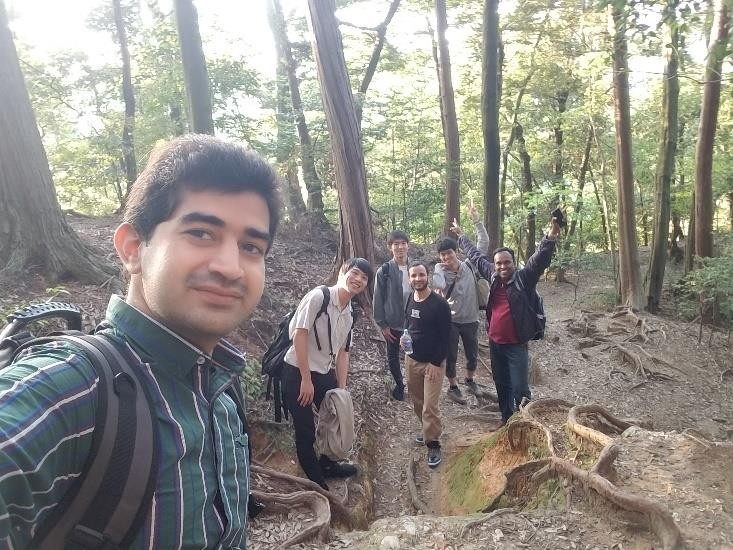 £Usual hangout with Lab Members
£Usual hangout with Lab Members
 £Final Defense
£Final Defense
£Japanese Language Speech Eiji: What did you really like to come to the University of Tokyo? I participated in the Japanese speech contest held at Civil Engineering last year, and I was impressed by the Japanese speeches of you. Khan: For me, it was like dream come true situation when I finally got admitted to The University of Tokyo because it got me one step closer to be the part of world leading research. By studying in this university, I have not only gained the technical knowledge, but by having interaction with Japanese students and other international students via different programs organized by university, I had wonderful experience of Japanese society. One of the most enjoyable and unforgotten experience was the Japanese Language Class - JLC held by Civil Engineering Department which I took for one whole year where I learned not only the Japanese Language but had first-hand experience of Japanese culture. Also, one of my most enjoyable moments was the time when I participated in May Festival where I had wonderful experience & interaction with Japanese people.
£May Festival 2018 Eiji: Ask about research. Khan worked on histrical logistics pattern analysis based on equilibrium theory. Can you explain your research? Khan: Many of the Developing countries are now passing through a phase of rapid development investing hugely in infrastructure. Pakistan is one of those countries where huge investment has been made on Transportation Infrastructure under the domain of Logistics for handling container traffic. But because of the non-availability of Past network data, there is no justification for the future investment (going in the dark situation). This led me to develop the past networks maps for which I used the Two Layered Network Assignment Model considering three networks i.e. Inter-modal Network, Maritime Network & Hinterland Network. Historical data for all the networks was obtained from different sources and then prepared for analysis for 4 different time periods i.e. 1983, 1993, 2003 & 2013. This research was a two level research where one level dealt with the Global evolution of Maritime Networks from 1983 to 2013 while the other level dealt with Inter modal Analysis for case of Pakistan where containerized traffic network maps were developed based on Multi Modal Equilibrium Assignment. Finally, the results were evaluated based on counter fact approach and policy was simulated in order to solve the problem identified & to achieve Pakistan Vision 2025. Eiji: The analysis of multi-scale logistics networks is very important when considering the partial OD patterns that have changed dramatically in recent years in South Asia. However, it was difficult to collect data, and Lloyds insurance data and field surveys were difficult.What is the most difficult point in the master's thesis? Khan: Most difficult point in my master's thesis was the preparation of historical data which was very challenging. I had to prepare 4 main data sets for each year (16 main data sets in total for all considered years). Non-availability of data led me to look at various sources from which I had to do many transformations, which were not only time taking but also very challenging. Not only that, but I had to do many field surveys exploring various libraries and visiting various departments in Pakistan. Eiji: On the other hand, when did you do your research and were most happy or interesting? Khan: Whenever I do a work, I do it perfectly giving it a serious dedication & interest and that is what I did with my research. There were some moments when things got stuck and made me a little tense but overall, whole of the research idea and work done was very interesting. Things got more interesting when I finally started to get my results of analysis based on which I made historical containerized traffic network maps of Pakistan. That was the moment of happiness, but of course, that was not the end of research. Eiji: How about thesis defense? You looks getting too nervous when your turn comes. Khan: Thesis defense itself is a very challenging moment where we need to present the core research in given time in front of an audience full of well experienced and knowledgeable professors. I worked very hard in order to achieve my master's research goal. After thesis submission, I practiced a lot for the presentation asking myself every possible question regarding my research. Since, presentation time was very less and the data to present was very much, things got a little nervous but I tried my best not to lose my confidence. I presented my research, answered the worthy questions asked to me by different professors up to a satisfactory point, hence successfully finished my final defense. Thesis submission & Final Defense
£Finishing Master thesis with Babar and Eiji Eiji: The master's defense is shorter than the amount Khan did in your master's thesis, lol. We all went to Kobe to study, but what is your favorite place in Japan and where do you like to settle down? Halal food stores and Muslim mosques are also increasing in Toshima. Khan: In my stay of two years in Japan, I have been to many places including Kobe, Kyoto, Osaka, Hiroshima, Ishinomaki, Nikko etc. Halal food stores and mosques are increasing in Tokyo but if we go out of Tokyo, it is relatively difficult to find halal food stores & mosques. No doubt, whole of the Japan is very beautiful and peaceful but I personally like historical & natural places in comparison with man-made places and because of it, my favorite places in Japan include Kyoto on top and then Hiroshima City. As far as settling down is concerned, I think most important factor in this regard is the Job location but regardless of it, Kyoto will be first on my list. If I have to settle down in Tokyo, then I really like Mitaka because it is a little far from the busy area, peaceful and convenient. Last but not the least, Dasio & Don Quijote are two of my most favorite stores in Japan?. Eiji: You strived harder for some goal, your family and country. My last question is about Japanese student and UT and Japan. Khan: If you are thousands of miles away from your home & your family, it is very difficult to achieve a goal without the worthy support and here came the part of Japanese students and this university. Throughout my journey of masterfs in University of Tokyo, I found other Japanese students (especially my Lab members and my friends) to be very kind and helpful not only in matters related to study but also related to daily Japanese life. Overall, I have learned so many things from Japanese people among which kindness & politeness are two main factors. Japan is very unique in terms of its culture & food which is essence of it and it made me love Tempura?. Being a Muslim, prayer place and Halal food are two of main concerns of mine. In this regards, University of Tokyo has provided with multiple options of Halal food across campus and also the prayer place which made my journey of masterfs smooth. It would have been very difficult for me to achieve my goal without all of the mentioned support by this university and Japanese students. I have learned so many positive aspects from Japan & Japanese people which I will definitely try to apply to my country.
£Usual hangout with Lab Members